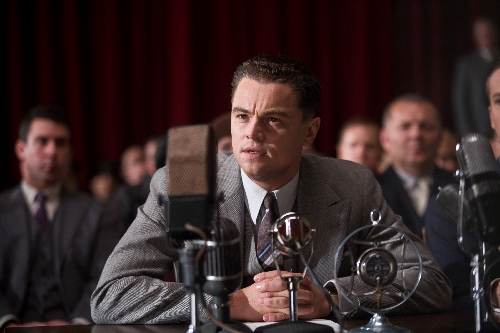Eastwood, DiCaprio’s ‘J. Edgar’ proves frustratingly short on character insight

Consider the curious case of "J. Edgar."
On paper, this J. Edgar Hoover biopic looks like a gangbusters, can’t-miss collaboration.
Consider: Double Oscar-winner Clint Eastwood directs from a script, by "Milk" Oscar winner Dustin Lance Black, that focuses on one of 20th-century America’s most powerful (and enigmatic) figures, who’s portrayed by three-time Oscar nominee Leonardo DiCaprio.
Yet as all dedicated moviegoers know, there’s often a slip between (script) page and (sound)stage. And, alas, "J. Edgar’s" essence, its very life force, seems to have gotten lost somewhere in between.
The movie is nothing if not ambitious, focusing as it does on the FBI’s first — and, for 37 years, only — director, a man who obsessively collected other people’s secrets even as he tried to guard his own.
All of which makes Hoover a potentially fascinating focus for any movie, especially one attuned to the ironic contrast between public and private lives.
Yet in trying to convey the scope of Hoover’s extended reign, "J. Edgar" too often loses its title character amid a time-marches-on cavalcade.
Playing Hoover as a determined young man of almost fossilized rectitude, DiCaprio captures the character’s crusaderlike commitment to might-makes-right law enforcement — and the swaggering bravado that transformed him into America’s top cop during Depression-era tumult, when tommy-gun-toting mobsters battled the feds for the American public’s affections. ("J. Edgar" deftly depicts this clash through clips from two contrasting James Cagney movies — 1931’s "Public Enemy" and 1935’s " ‘G’ Men" — that, brief as they are, deliver more dynamic excitement than the rest of the movie put together.)
Hoover consolidates his power — first as head of the Justice Department’s Bureau of Investigation, then the newly created FBI — through eight presidential administrations, three wars and untold investigations. In the process, "J. Edgar" touches on everything from the FBI’s investigation of the then-"crime of the century" — the 1932 kidnapping of aviator hero Charles Lindbergh’s baby, which prompted breakthroughs in scientific crime investigation — to his penchant for compiling blackmail-quality evidence of the sexual escapades of John F. Kennedy, Martin Luther King Jr. and other public figures.
As for Hoover’s own sexual escapades, "J. Edgar" neither whispers nor shouts about his longtime relationship with right-hand man Clyde Tolson ("The Social Network’s" insouciant Armie Hammer), his dapper deputy at the FBI.
Such nuance stands out in a movie that proves frustratingly short on character insight as the aged Hoover recounts his memories — the professional ones, anyway — to a succession of young FBI agents who dutifully transcribe his recollections.
In the beginning, just after World War I, there was no FBI, Hoover remembers. But there were agitators, anarchists, Bolsheviks and other assorted radicals determined to undermine, and overthrow, domestic tranquility, all of which fostered Hoover’s dedication to rooting out Communist subversives he perceived as threats to public safety. (Any link between then and our own jittery post-Sept. 11 now is hardly coincidental, "J. Edgar" suggests.)
After office hours, Hoover takes his all-American zeal home to his judgmental mother (a chilly Judi Dench), with whom Hoover lives until her death. Only one other woman finds a permanent place in his life: the inexplicably loyal Helen Gandy (Naomi Watts, stranded in a thankless role), who rebuffs his awkward romantic advances but agrees to become his personal secretary, keeping Hoover’s secrets until the end — and beyond, when she shreds the director’s secret files so then-President Richard Nixon’s men can’t see what’s in them.
As for Hoover’s other close relationship, "J. Edgar" matter-of-factly captures his longtime bond with Tolson — and suggests how it threatens his public image as all-American crimefighter — without ever really revealing the emotions behind it.
Then again, "J. Edgar" is not any more comfortable with matters of the heart than its title character.
Eastwood mostly sticks to just the facts, ma’am, trying to create contrast between the movie’s eras through a desaturated color scheme that doesn’t always work the way he or director of photography Tom Stern (who’s worked with Eastwood since the early ’80s) intends. And as "J. Edgar" slogs rather than skips between the decades, accompanied by Eastwood’s own tinkling piano score, your eye (and mind) may wander toward James J. Murakami’s detailed production designs rather than the movie’s gallery of cameos. (Look! There’s Josh Lucas as Lindbergh! Jeffrey Donovan as Robert F. Kennedy! Lea Thompson as Ginger Rogers’ mother?!)
Or maybe it’s just the waxworks-worthy makeup that buries "J. Edgar’s" human element — and, ultimately, DiCaprio along with it.
Playing the title character as a younger man, DiCaprio ably conveys not only Hoover’s self-doubt but his bulldog determination to conceal, and triumph over, inner doubt and insecurity. As the character ages, however, the actor is buried beneath a ton of latex, silicone and prosthetics that not only restrict his expressive facial movements but make it virtually impossible for him to disappear inside Hoover’s conflicted character. (Those brown contact lenses blocking Leo’s baby blues don’t help either.)
At times, DiCaprio almost looks as though he’d like to claw through all the gunk so he could find direct access to Hoover’s inner demons. But he can’t — and while that may accurately reflect the character’s own peculiar, precarious balancing act, it doesn’t do much to give DiCaprio, or "J. Edgar," the kind of breathing room it needs to truly come alive.
Contact movie critic Carol Cling at ccling@reviewjournal.com or 702-383-0272.